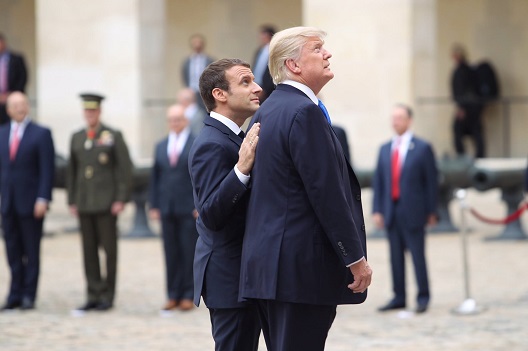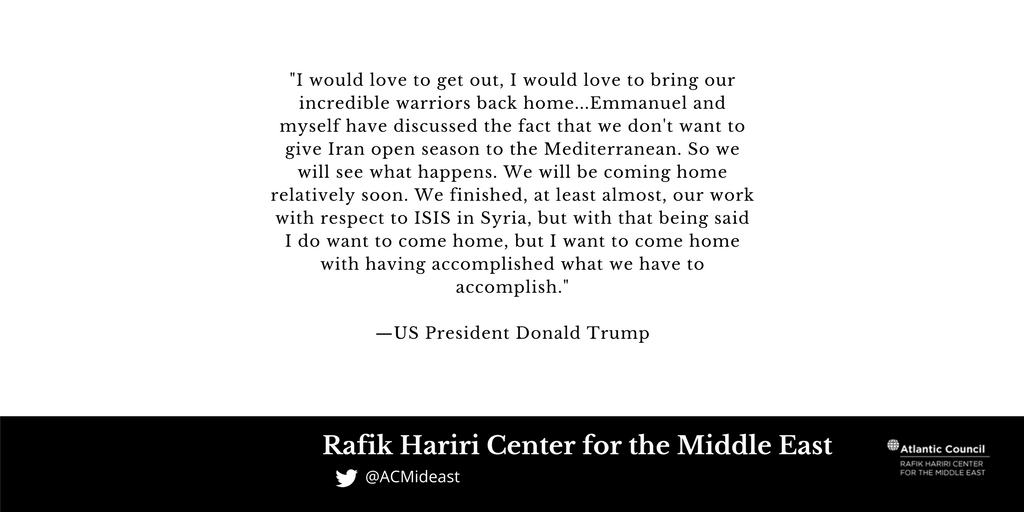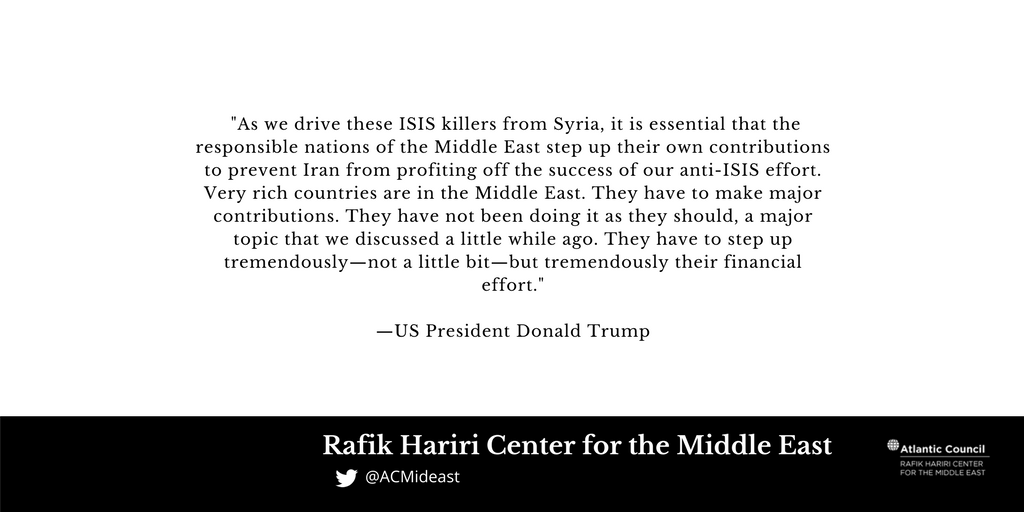 During a state visit to the United States, US policy in Syria was a key talking point for French President Emmanuel Macron and US President Donald Trump. The meetings took place just ten days after the US, France, and the United Kingdom carried out joint missile strikes in Syria as a response to suspected chemical weapons attack on April 9 by the regime.
During a state visit to the United States, US policy in Syria was a key talking point for French President Emmanuel Macron and US President Donald Trump. The meetings took place just ten days after the US, France, and the United Kingdom carried out joint missile strikes in Syria as a response to suspected chemical weapons attack on April 9 by the regime.
US-Syria Policy in the Rearview Mirror
April 4: Less than ten days prior to the suspected chemical weapons attack, Trump had instructed the US military to begin planning for the full withdrawal of forces fighting the Islamic State (ISIS) in Syria. He made it clear his administration was not in the business of ‘fixing’ Syria or the Middle East.
April 13: As he announced the retaliatory strikes against Syria, Trump emphasized this point: “America does not seek an indefinite presence in Syria—under no circumstances…No amount of American blood or treasure can produce lasting peace and security in the Middle East. It’s a troubled place,” he said.
April 15: In response to the chemical weapons attack, the Trump administration also planned to impose new sanctions targeting Russian companies that enable Syria’s chemical weapons program. However, more than two weeks after the announcement, sanctions have yet to be officially announced. A senior White House administration official said that sanctions against Russia remain under consideration, but the timing remains uncertain.
April 16: Three days after the missile strikes by US and European allies, during a live TV interview, Macron claimed that he persuaded his American counterpart against withdrawing forces from Syria and to limit missile strikes to known chemical weapon sites only.

April 16: The White House swiftly pushed back on Macron’s statements. White House Press Secretary Sarah Huckabee Sanders said, “Our policy hasn’t changed… We still have troops on the ground. But the President wants to bring those people home, and that hasn’t shifted.”Top military officials, allies and regional experts warn that the premature withdrawal of US forces in Syria could create a power vacuum in the region for Russia or Iran to exploit, or could allow for the revival of the Islamic State.
Congressional Position
As the White House reassesses involvement of US forces in Syria following the missile strikes, lawmakers disagreed on the appropriate role that the US should play in the country.
Congress did not authorize the missile strikes against Syrian targets, which drew mixed reactions from both members of the House and Senate.
April 20: A bipartisan letter sent to Trump on April 20—led by Representative Adam Kinzinger (R-IL), co-chair of the Syria Caucus—applauded the Trump administrations’ response to the chemical attack and urged for a continued presence in Syria.
Last week, I led a bipartisan letter to @POTUS applauding the #Syria strike & urging a continued effort in the region to stop #Assad & his backers from their war crimes & #genocide. America’s global leadership is critically important. pic.twitter.com/Mmfsu1VAil
— Adam Kinzinger (@RepKinzinger) April 23, 2018
Minority Leader Nancy Pelosi (D-CA) and others also supported the action, but called for Trump to seek Congressional authority for future action, citing the Constitution and the 1973 War Powers Resolution.
Representative Tim Kaine (D-VA) had an opposing view, saying the missile strikes were ‘illegal’ and Trump owed members an explanation.
Others expressed concern for the Trump administration’s strategy. Senator Chris Coons (D-DE), a member of the Senate Foreign Relations Committee said, “While I’m encouraged that the Trump administration has felt compelled to act forcefully in Syria against the Assad regime, I’m gravely concerned that the United States is engaging further militarily in Syria without a well-thought-out, comprehensive plan.”
In an effort to moderate the Trump administrations unauthorized military actions, the Senate Foreign Relations Committee unveiled a revision of the Authorization for Use of Military Force (2001) in mid-April; which would give Trump the authority to fight new terrorist organizations, such as ISIS. The revision also maintains the right for Congress to limit the commander in chief’s power to carry out the war on terror. The new bipartisan proposal is the last attempt to modernize and replace the 2001 war authorization, which permitted military action against al-Qaeda and the Taliban, and continues to provide the legal rationale for the current US campaign against ISIS in Syria.
Trump-Macron Meeting: An Ambiguous US-Syria Policy
April 24: During a joint press conference with Macron, Trump’s stance on the presence of US forces coalition forces in Syria remained ambiguous:
While Trump remains adamant that US troops in Syria will be coming home ‘relatively soon,’ he did seem to support the possibility of long-term engagement in the country, saying he would like to leave a ‘strong and lasting footprint’ in the country.
The Trump administration has also considered the possibility of assembling an Arab military coalition to replace US forces in Syria to help stabilize the country after the defeat of ISIS.
During the joint press conference, Trump foreshadowed the possibility of a financial and military contribution by Arab states to a possible coalition, calling for regional states to contribute boots on the ground in Syria to help stabilize the state in the post-ISIS era.
Trump and Macron also discussed the Iran nuclear agreement, proposing the possibility of forging a new agreement altogether. A new agreement would address the Syrian conflict and “generate the conditions for solutions—a political solution to counter Iran in the region…It is also within this framework that together in the long run we can find a solution to the Syrian situation.”
Macron emphasized the role of the international community once the Syrian conflict is over. He expressed concern for the political future of Syria, specifically the sovereignty, inclusiveness, and self-determination of the Syrian people to write their own future.
April 25: While he did not make explicit reference to the conflict in Syria during a speech in Congress, Macron’s words on fighting for freedom and “strong multilateralism” were interpreted by some as a call for the US to remain engaged in the region, and particularly in Syria.
Macron also attended a townhall meeting at George Washington University, where he said that his position on Syria is similar to that of Trump’s and was encouraged by the US president’s willingness to pursue a peaceful solution to the conflict.
Yousuf Eltagouri is an intern at the Rafik Hariri Center.
Image: Photo: President Trump and President Macron at Les Invalides for official ceremonies. From Wikimedia Commons, the free media repository.
